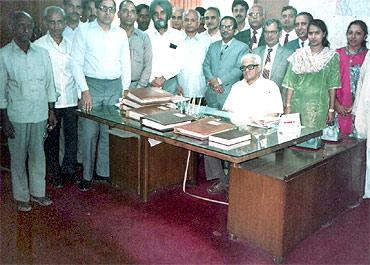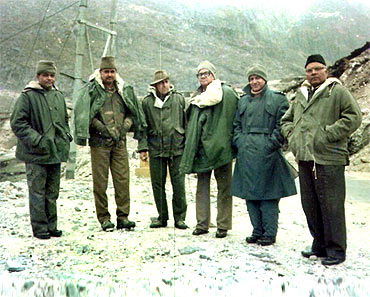Colonel (Dr) Anil Athale remembers the contributions of military historian S N Prasad, who turned 90 recently.
Indian civilisation is peculiar in some ways. Its view on life as endless cycle has influenced it to neglect history. When one attempts to reconstruct Indian past, one has no choice but to look at works of Al Barauni, Ibna Batuta, Toynbee Hue Enet Sung etc. The situation is worse when it comes to military history. In India we have treatises on philosophy, religion, science, mathematics and even sex, but none on warfare! There is no Indian Sun Tzu or Carl von Clausewitz. For this neglect of the military dimension India paid a heavy price, it is no wonder that Indian history can also be described as a chronicle of military disasters.
In modern era, there have been some exceptions and it goes to the credit of Dr Shri Nandan Prasad to fill this gap and attempts to start an Indian school of military history. On September 18, Prasad turned 90, this is an attempt of this author to acquaint readers with the immense contributions of this great son of India.
Dr Prasad, born in 1921, is one of India's most respected military historians. After a doctorate in history from the Allahabad University, he pursued his post-doctoral research on military history at Princeton University, on a Rockefeller Foundation Fellowship. Joining the government of India in 1948, as a senior researcher in the historical division, ministry of defence, he became its director in 1964 and later headed the National Archives of India from 1969 to 1979. Dr Prasad was a member of the Executive Committee of International Council on Archives, Paris, from 1972 to 1980. He was also elected as the vice president of ICA in 1980, becoming the first person from the third world to be so honoured.
He was re-appointed by the government of India, as the chief editor and joint secretary (history), war studies division, ministry of defence in 1980. Soon after Indira Gandhi came to power in 1980 she is reported to have inquired from the then Vice Chief of Army, Lieutenant General Sinha, if she could have a look at the official history of the 1971 India-Pakistan War! It was her greatest triumph and she naturally wanted to see how history treated her! Lt Gen Sinha told her we did not have any official history of the 1971 war.
Determined that her own place in history should be secure, Indira Gandhi asked Lt Gen Sinha to search for a suitable person to head the team to complete this project. This is the story behind Dr Prasad's second innings in the defence ministry. Dr Prasad formed a team of historians and representatives from army, navy and the air force. The team worked diligently, visiting all the battlefields, interviewing hundreds of participants and poring over government records (including most interestingly the top secret proceedings of Cabinet Committee of Political Affairs -- India's highest decision making body). As promised, Dr Prasad completed and handed over the nearly 1,000 page work to Mrs Gandhi in 1983. Mrs Gandhi was delighted and remarked that it was one of the first research projects that she knew of, that was completed in time.
Happy with the work on 1971 war history, Indira Gandhi decided to extend the life of war history division and asked Dr Prasad to compile and write the official history of the 'other' conflicts -- the 1962 India-China War, 1965 Indo-Pak war and counterinsurgency operations in Nagaland and Mizoram.
Dr S N Prasad: A doyen among military historians
Image: Dr Prasad (third from right) at Sela PassThis author, a freshly minted PhD from Pune University, joined the division in 1986 and worked on the history of 1962 India-China war and insurgency in Mizoram under guidance of Dr Prasad. So interestingly, the war history division, finished the project on 1971 war first, and only thence began the work on older conflicts.
Dr Prasad retired in 1990, but by then the official history of 1962, 1965 wars and counterinsurgency in north-east was completed and handed over to the ministry of defence. True to the bureaucratic norms of secrecy, the histories were promptly marked 'secret' and put on the shelves in the ministry. It is under the National Democratic Alliance regime that the official histories were apparently 'leaked' to the media and are today available on the net.
The histories of our post independence wars are unfortunately mired in red tape with the governments refusing to publish them under one pretext or the other. Imagine, the history of 1947-48 J&K operations was published only in 1987, thanks to the initiative by Dr Prasad. We seem to have forgotten the old saying that those who forget their history are condemned to repeat it! Hasn't India suffered enough due to invasions and foreign rule?
Dr. Prasad (as well as this author) has searched for an answer to this perennial Indian weakness. His analysis of what is wrong with Indian thinking on defence is of great relevance in this day and age when we seem incapable of stopping the terror attacks on our country.
In asn introduction to a book Historical Perspectives of Warfare in India (Vol X Part 3 of 'History, Science, Philosophy & Culture" project under Professor D P Chattopadhayay), (paraphrased by the author) Dr Prasad points out the ideological weakness of Indians,
"The most potent and deep acting source of military weakness is the unique Hindu ethos itself. Rooted in the attitude of anti-predatory universalism, contemplative passivity and inherent moderation, the Indian psyche presents an anti thesis to 'total war'. This placed the Indian at a decisive disadvantage vis-a-vis the alien invader.
The invader fought to win. The Hindus fought to gain glory. The invaders were concerned with only the 'end': the defenders only with the 'means'. The invader wanted change and had taken the initiative, risking his life by choice. The defender was compelled to risk his life and had the static and negative war aim of preservation of status quo.
The initiative of deciding the time, place, route etc of the attack always lay with the invader and the defender had to play to his tune.
Wars in India between two Indian rulers were continuance of politics and diplomacy with an odd day or two of violence and bloodshed, almost an interlude, while the wars against the invaders were total wars. Indians have consistently failed to understand this difference and paid a terrible price.
The influence of this peculiar Indian ethos is discernable from mythology and scriptures. Knowledge of warfare and weapons was to be imparted only to suputraa (worthy son). Only Dharma Yudha (righteous war) was permissible and it had to be fought only by righteous means! The Bhagvat Gita declared that the God will reincarnate Himself to defend and restore Dharma."
(Author's comments: This makes the study of war, new weapons or tactics etc superfluous and unimportant to an Indian mind.)
"Was this inbuilt military weakness in Hindu psyche planted by the Gods to offset its omnivorous, all solvent culture and religion? Vasudheva Kutumbakam (mother earth's family including all living beings) after all transcends all differences of race, religion, region and genus. The killer instinct simply cannot survive in an ambiance of Vasudheva Kutumbakam. In fact, who wins or loses a war then becomes inconsequential.
The Indians achieved universalism and transcendental cognition thousands of years before the world was ready for it: the Indian has paid the price for thousands of years. It has lost battles, but may yet win the war, unless war, which predates civilisation, ends in a nuclear holocaust for India."



article